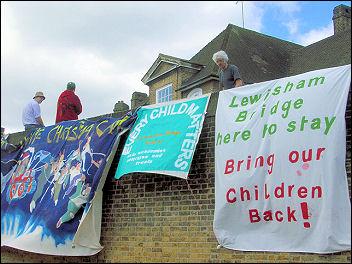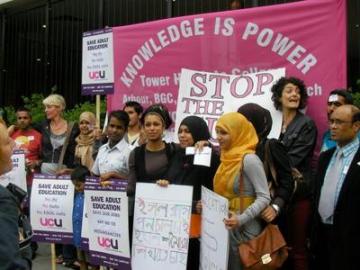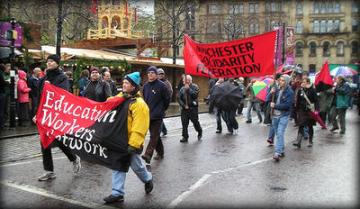Crisis, cuts and class conflicts
2009 has seen a wave of workers’ struggles against the effects of the recession.
Firstly, workers at Lindsey Oil Refinery (LOR) in Lincolnshire staged an unofficial walkout over claims that foreign workers were being used to undermine a national agreement on pay and conditions. Solidarity walkouts rippled across the country at 13 refineries and power stations from Longannet in Fife to Milford Haven in South Wales to Langage Power Station near Plymouth, involving in total upwards of 4,000 workers.
While the media were quick to pick up on the slogan ‘British Jobs for British Workers’ that some strikers echoed back to Gordon Brown, the reality was the demands of the LOR workers reflected working class solidarity - making no reference at all to ‘British workers’ and calling for assistance to migrant workers.
Not only that, the refinery strikers openly defied the laws banning solidarity strikes with impunity – and won – providing the latest example that ‘direct action gets the goods!’ Shortly after the refinery strikes, laid-off employees at Prisme Packaging in Dundee occupied their plant. They suceeded in re- opening the factory as a workers’ co-op, securing the income of the nine workers after bosses had tried to withold even redundancy pay.
Following hot on the heels of the Prisme occupuation, workers at Ford-Visteon in Belfast responded to being laid-off with only 6 minutes notice and no redundancy pay by occupying their factory. As news spread, workers at Visteon’s two other UK factories in Basildon and Enfield followed suit.
Occupy! Resist!
The Belfast occupation was maintained for over a month, ignoring union ‘advice’ that the occupation was illegal (it wasn’t) and ceremoniously burning court possession papers granted in favour of Visteon.
When the dismissed Visteon workers began preparing a delegation to visit Ford’s UK factories to encourage solidarity strikes, bosses suddenly returned to the table (as union bosses tried to call-off the delegation). A partial victory was won, although some issues, such as pensions were left unresolved.
Coinciding with the Visteon occupations, several schools in Glasgow and South London were occupied by angry parents protesting against closure plans. The occupation of Lewisham Bridge primary in South London was inspired by the ongoing Glasgow ‘Save Our Schools’ campaign and the Visteon occupations.
Workers from Visteon visited the school and spent some nights on the roof in solidarity with the occupiers. Charlotte Turner primary in nearby Deptford was also occupied after the council ignored a sham ‘consultation’ exercise which returned 296 out of 297 responses opposed to closure. Lewisham Bridge was a resounding victory, with parents forcing the council to abandon their plans to demolish the school.
Profit before planet
Another high-profile occupation began in July after 625 workers at Vestas Blades, a wind turbine manufacturer in the Isle of Wight were laid off in similar circumstances to the Visteon workers earlier in the summer.
Around 20 workers responded by occupying the plant, pointing to the farce that the closure of the UK’s only wind turbine plant came just hours after the government announced plans to build 10,000 more wind turbines as part of its green energy ‘commitment.’ Vestas had had no problem pocketing several million pounds in government cash just before the redundancies were announced.
After resisting management and police attempts to literally starve them out – one worker was taken to hospital with low blood sugar levels but supporters risked arrest to break the siege and deliver much needed supplies – the workers ended their occupation after nearly three weeks.
Whilst the occupation did not achieve its goal of keeping the factory open, it highlighted the severe lack of jobs on the island and drew attention to the fact that despite the rhetoric, the environment will also be made to pay for capitalism’s crisis.
There have also been ongoing official and unofficial postal strikes up and down the country before voting overwhelmingly, for national strikes (see page 8), disputes including refuse workers in Leeds, Edinburgh and Brighton, and an indefinite strike over cuts by education workers in Tower Hamlets, London which secured a partial victory guaranteeing no compulsory redundancies.
Back to the future?
This resurgence in working class militancy has already got sections of the ruling class scared. The ‘favourite think tank’ of Tory leader and likely next Prime Minister David Cameron has even warned of a “new age of militancy.” From Page 1 Against this backdrop, the BBC’s economics editor writes that “the crucial difference between Labour and Tories is not so much the scale of spending cuts - but the timing.” The Liberal Democrats say no public services should be “ring-fenced” from cuts.
The political consensus is clear: drastic cuts are on the way, with talk of spending being slashed by at least 10% over the next three years.
Reportedly the favoured model is Sweden, where major cuts were made following a budget crisis in the 1990s. According to the BBC “even though it was a Social Democrat wielding the axe, it was Sweden’s over- arching welfare state which received most of the cuts.” With an election looming all the politicians will deny it, but there’s no doubt they intend to make the working class pay for the crisis.
The last years of the ‘economic boom’ saw numerous workers’ struggles against sub- inflation pay offers and deteriorating terms and conditions, which came following years of real-terms decline.
Then when the recession hit, workers were urged to tighten their belts for the good of the economy, as unemployment rocketed, pay was slashed and home repossessions reached record levels. Now there is talk of economic recovery, politicians of all stripes are already planning how best to make workers pay.
This underlines a simple fact absent from most mainstream commentary: it is not the health of the economy that determines workers’ living standards, but our ability to collectively impose our needs on the bosses. Without this collective power, economic growth is simply accumulated by the bosses as profit, and economic crises have their costs passed on to weak and disorganised workers.
By contrast, when workers take collective direct action, they are able to improve their conditions regardless of whether the economy is in boom or bust. Sections of the ruling class are alert enough to fear this; it’s up to us to make their fears into reality.



